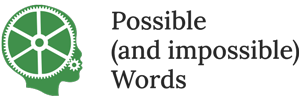
The child’s mind
Not just letters, spellings, sounds
In the treatment of speech and language impairment, linguistics prompts a focus on what is happening in the mind of the child. Words can be not what they seem. Or mean more than one thing. How much does the child understand? This is never obvious. Questions can be meant in a way that is not easy to work out.
All aspects of language have structure and rhythm, at least down to the level of the words and arguably down to the sounds within them. This must, by the argument of the proposal here, be true of the first words.
Children naturally pay very close attention to what they hear being said. They can pick up a new word from hearing it just once. After overhearing an adult discussion about which members of the family were doing what in which athletics event, with some obvious evidence of talent across the generations and genes seemingly involved, a child might say: “I think I’ve got sport in my genes”. Or, as one of my children once said, “I think I’ve got linguistics in my genes”. It is not obvious whether to write this as genes or jeans. Children may understand more from adult conversation than they are expected to understand.
So where a child’s issue might seem to centrally involve particular structures, intervention, in my view, is still best focused not on particular instances of those structures, but rather on POSSIBLE forms of them, a much bigger, and I think, a more important, more interesting, more useful, objective. The learning process here is one that happens in the mind of a child. (Learning is a rather inadequate term for what seems to be happening here.) But, in my view and my experience, this focus on the mind of the child gets the fastest results. Hence the name of my clinic.
Speech and language are not behaviour. They are meaningful. Behaviour can have meaning. But the meaning is subject to debate and argument. The meaning of speech and language is a defining property.

